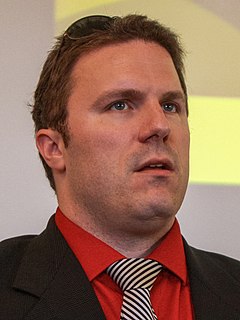A Quote by Kenneth Clarke
Referendums are designed to get round parliamentary government, and people only demand referendums when they think they can't get a majority in parliament. Mussolini was the most brilliant practitioner of referendums.
Related Quotes
In referendums in 2005, the Dutch and the French electorates rejected the European Constitution, which aimed to turn the E.U. into a genuine state. But Brussels refused to take no for an answer. It went ahead with its plans for a constitutional treaty, notwithstanding the people's opposition. Brussels thinks it knows better than the people.
Brexit wasn't the European people's first cry of revolt. In 2005, France and the Netherlands held referendums about the proposed European Union constitution. In both countries, opposition was massive, and other governments decided on the spot to halt the experiment for fear the contagion might spread.
We should, through civic referendums, determine our own pathways and political status after 2047, because in this lies the future of our democratic movement. If Hong Kong could exercise democratic self-governance under the sovereignty of China, it would not be necessary for us to take this step on the path toward independence.
There should be some other provisions in the Constitution whereby if the Government is not functioning well, it can be dealt with. In a parliamentary democracy, this should be done only by Parliament. The prime minister should be answerable only to Parliament and it should only be Parliament that can install him or remove him.
There are a few minority governments in Europe, but I think the largest member state would be well-advised to establish a government that can rely on a clear parliamentary majority. Think about EU summits. If the chancellor were forced to obtain support from parliament for each and every detail, it would slow the work of the EU.
































